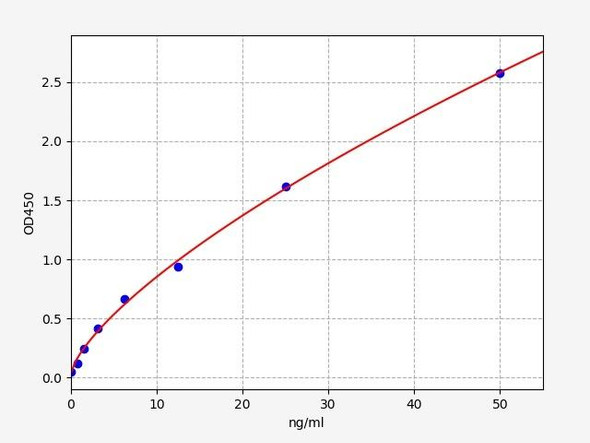Description
| Product Name: | Human SFTPB Recombinant Protein |
| Product Code: | RPPB4653 |
| Size: | 10µg |
| Species: | Human |
| Target: | SFTPB |
| Synonyms: | Pulmonary surfactant-associated protein B, SP-B, 18 kDa pulmonary-surfactant protein, 6 kDa protein, Pulmonary surfactant-associated proteolipid SPL(Phe), SFTPB, SFTP3. |
| Source: | HEK293 Cells |
| Physical Appearance: | Filtered White lyophilized (freeze-dried) powder. |
| Formulation: | SFTPB filtered (0.4 �m) and lyophilized from 0.5mg/ml solution in PBS and 5% trehalose (w/v), pH 7.4. |
| Solubility: | It is recommended to add deionized water to prepare a working stock solution of approximately 0.5mg/ml and let the lyophilized pellet dissolve completely. |
| Stability: | Store lyophilized protein at -20°C. Aliquot the product after reconstitution to avoid repeated freezing/thawing cycles. Reconstituted protein can be stored at 4°C for a limited period of time; it does not show any change after two weeks at 4°C. |
| Purity: | Greater than 95.0% as determined by SDS-PAGE. |
| Amino Acid Sequence: | WTTSSLACAQ GPEFWCQSLE QALQCRALGH CLQEVWGHVG ADDLCQECED IVHILNKMAK EAIFQDTMRK FLEQECNVLP LKLLMPQCNQ VLDDYFPLVI DYFQNQTDSN GICMHLGLCK SRQPEPEQEP GMSDPLPKPL RDPLPDPLLD KLVLPVLPGA LQARPGPHTQ DLSEQQFPIP LPYCWLCRAL IKRIQAMIPK GALAVAVAQV CRVVPLVAGG ICQCLAERYS VILLDTLLGR MLPQLVCRLV LRCSMDDSAG PRSPTGEWLPR DSECHLCMSV TTQAGNSSEQ AIPQAMLQAC VGSWLDREKC KQFVEQHTPQ LLTLVPRGWD AHTTCQALGV CGTMSSPLQC IHSPDLHHHHHH |
SFTPB is an amphipathic surfactant protein critical for lung function and homeostasis after birth.�Pulmonary surfactant is a surface-active lipoprotein complex composed of 90% lipids and 10% proteins which consist of plasma proteins and apolipoproteins SPA, SPB, SPC and SPD. Pulmonary surfactant-associated proteins support alveolar stability by lowering the surface tension at the air-liquid interface in the peripheral air spaces. The SPB improves the rate of spreading and increases the stability of surfactant monolayers in vitro. SPB increases the collapse pressure of palmitic acid to approximately 70 millinewtons per meter.
SFTPB Human Recombinant is a single, glycosylated polypeptide chain containing 363 amino acids (25-381a.a) and having a molecular mass of 40.4kDa (calculated). SFPTB is fused to a 6 a.a on C-terminal.
| UniProt Protein Function: | SFTPB: Pulmonary surfactant-associated proteins promote alveolar stability by lowering the surface tension at the air- liquid interface in the peripheral air spaces. SP-B increases the collapse pressure of palmitic acid to nearly 70 millinewtons per meter. Defects in SFTPB are the cause of pulmonary surfactant metabolism dysfunction type 1 (SMDP1); also called pulmonary alveolar proteinosis due to surfactant protein B deficiency. A rare lung disorder due to impaired surfactant homeostasis. It is characterized by alveolar filling with floccular material that stains positive using the periodic acid- Schiff method and is derived from surfactant phospholipids and protein components. Excessive lipoproteins accumulation in the alveoli results in severe respiratory distress. Genetic variations in SFTPB are a cause of susceptibility to respiratory distress syndrome in premature infants (RDS). RDS is a lung disease affecting usually premature newborn infants. It is characterized by deficient gas exchange, diffuse atelectasis, high-permeability lung edema and fibrin-rich alveolar deposits called 'hyaline membranes'. A variation Ile to Thr at position 131 influences the association between specific alleles of SFTPA1 and respiratory distress syndrome in premature infants. |
| UniProt Protein Details: | Protein type:Secreted, signal peptide; Secreted Chromosomal Location of Human Ortholog: 2p12-p11.2 Cellular Component: extracellular space; lysosome Biological Process: organ morphogenesis; sphingolipid metabolic process; respiratory gaseous exchange Disease: Surfactant Metabolism Dysfunction, Pulmonary, 1 |
| NCBI Summary: | This gene encodes the pulmonary-associated surfactant protein B (SPB), an amphipathic surfactant protein essential for lung function and homeostasis after birth. Pulmonary surfactant is a surface-active lipoprotein complex composed of 90% lipids and 10% proteins which include plasma proteins and apolipoproteins SPA, SPB, SPC and SPD. The surfactant is secreted by the alveolar cells of the lung and maintains the stability of pulmonary tissue by reducing the surface tension of fluids that coat the lung. The SPB enhances the rate of spreading and increases the stability of surfactant monolayers in vitro. Multiple mutations in this gene have been identified, which cause pulmonary surfactant metabolism dysfunction type 1, also called pulmonary alveolar proteinosis due to surfactant protein B deficiency, and are associated with fatal respiratory distress in the neonatal period. Alternatively spliced transcript variants encoding the same protein have been identified.[provided by RefSeq, Feb 2010] |
| UniProt Code: | P07988 |
| NCBI GenInfo Identifier: | 288856299 |
| NCBI Gene ID: | 6439 |
| NCBI Accession: | NP_000533.3 |
| UniProt Secondary Accession: | P07988,Q96R04, |
| UniProt Related Accession: | P07988 |
| Molecular Weight: | 42,117 Da |
| NCBI Full Name: | pulmonary surfactant-associated protein B |
| NCBI Synonym Full Names: | surfactant protein B |
| NCBI Official Symbol: | SFTPB�� |
| NCBI Official Synonym Symbols: | SP-B; PSP-B; SFTB3; SFTP3; SMDP1�� |
| NCBI Protein Information: | pulmonary surfactant-associated protein B; 6 kDa protein; 18 kDa pulmonary-surfactant protein; pulmonary surfactant-associated proteolipid SPL(Phe) |
| UniProt Protein Name: | Pulmonary surfactant-associated protein B |
| UniProt Synonym Protein Names: | 18 kDa pulmonary-surfactant protein; 6 kDa protein; Pulmonary surfactant-associated proteolipid SPL(Phe) |
| Protein Family: | Pulmonary surfactant-associated protein |
| UniProt Gene Name: | SFTPB�� |
| UniProt Entry Name: | PSPB_HUMAN |










